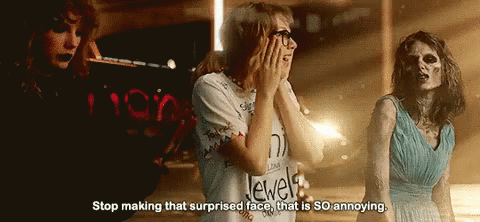art criticism + 'career Narnia': August 2023 Essay Recommendations
Seismically or slightly, everything's shifting: social media, anti-racism, moral art critiques, and the Christian fiction label... This month's most thought-worthy takes.

This month has been full of tightly-focused research and painstakingly slow writing sessions, and I can’t wait to share the end result(s) of all of that. But in the interstitials, I found a few interesting reads.
moral evaluation of art
I have many pointed thoughts and an abundance of devil’s advocate commentary about
’s piece, “Christian Faithfulness in an Age of ‘Babylon.’” The short-and-long of his take is that Christian film critics generally went easy on the orgiastic and exploitative Babylon film, while secular critics condemned it as, well, orgiastic and exploitative. Cap writes:The onscreen immorality of Babylon seems largely tolerated by Christian film critics—but it’s a form of immorality less tolerated even among pagans…
For the Christian especially (in theory, at least), a film should be evaluated both artistically and morally. To evaluate one while ignoring the other is to leave one’s job incomplete.
🤔🤔 So…who makes the rules for the art critic who is also a Christian?
While I don’t have a habit of reading reviews of films I haven’t seen and won’t start now, I suspect Cap of a bit of cherry-picking-to-prove-a-point. Regardless, I think the questions raised are worthy of wrestling with.
How expansive should the moral dimension be when it comes to evaluating art?
Is the art immoral if it portrays immoral behavior?
Can art which portrays bad morality be good art?
Why, when it comes to Christian critics, does the moral aspect of art criticism come up more urgently when the morality in question (or lack thereof) is of a sexual nature?
I won’t go too hard on Cap here, because he, like me, thinks Christopher Nolan is the GOAT, and his “Christopher Nolan in Three Acts” piece is on my TBR shortlist. (I’m going to make a cup of tea and savor it.) Further to the point of the piece I’m recommending here, he sees (then-reported) nudity in Oppenheimer (having not seen the film himself) as “a thoroughly disappointing step down” for the filmmaker. And I think the Christian auto-response of bad! to nakedness in visual art is worth interrogating.
closing the door to ‘career Narnia’
Last month saw dramatic shifts in the social media landscape: Meta launched Threads, its attempt at a Twitter-killer—which, for all its lack of luster, may have succeeded. Twitter doesn’t exist; it’s called X now. Naturally, these shifts prompted some nostalgic reflection, and I strongly identify with
’s elegy for Twitter, “Is social media over—or are we just older now?” She captures how I came to feel about the bird app after joining twelve years ago. (It’s been that long. 😭)Twitter was the door to Career Narnia in a world where it was impossible to find people’s email addresses unless you knew them personally.
Is it strange that I feel so forlorn about its demise? Turns out, it makes sense to mourn something that was a huge part of your life.
(Also, I never thought career and Narnia could fit beside each other in the same sentence. 💓)
Meanwhile,
posits a dark future seeing Twitter rebranding to X as evidence that we’ve entered the self-loathing stage of the internet.The early days of the web were a time of energy, excitement, and promise. We have now entered the phase of shame and self-loathing. If the early web reminded us of Dr. Seuss, we’ve now entered an H.P. Lovecraft horror tale…
The businesses themselves feel tainted. And the users of these platforms increasingly exhibit the same symptoms of self-loathing—almost as if viral media spreads actual viral contagion.
against “Christian” fiction
I’m leaving this here because it’s an argument I’ve made (in private) before: we shouldn’t use Christian as a genre label, whether in music stores, bookstores, or art galleries. Mostly because it’s not a logical descriptor of a definable type of art. In her LitHub piece, A Case for Withdrawing the Genre of “Christian Fiction,” Chelsea Leah argues the same for other reasons.
Some authors may prefer that their novels be published by a house that shares their Christian beliefs, but bookselling does not need to separate their releases from others. There’s not just a loss of potential readers to consider, but a monetary one as well: dollars derived from customers who thrive on the discovery aspect of shopping in store [or online] but may not venture over to the religion section. These losses affect authors and publishers alike.
Many readers who aren’t Christian desire the same sort of fiction as many readers who are—they want smutless stories without swear words or gore, with hopeful, uplifting endings. And, Leah argues, there very often isn’t anything distinctively Christian about much of the fiction that falls under that label. It’s all positive, encouraging, K-LOVE stuff—which isn’t bad, but anyone’s capable of enjoying it.
racism vibe shift
The progressive, anti-racism movement of the past few years has led to a whole swathe of people dealing with racism very badly. It’s frustrating for the people whom the anti-racists (you know who you are) think they’re helping and allying with or whatever. I love, love, love black professor Tyler Austin Harper’s piece in The Atlantic, “I’m a Black Professor. You Don’t Need to Bring That Up.”
The anti-racist culture that is ascendant seems to me to have little to do with combatting structural racism or cultivating better relationships between white and Black Americans. And its rejection of color-blindness as a social ethos is not a new frontier of radical political action.
No, at the core of today’s anti-racism is little more than a vibe shift—a soft matrix of conciliatory gestures and hip phraseology that give adherents the feeling that there has been a cultural change, when in fact we have merely put carpet over the rotting floorboards…
The fact that our media environment is inundated with an endless stream of books, articles, and social-media tutorials that promise to teach white people how to simply interact with the Black people in their life is not a sign of anti-racist progress, but of profound regression.
Let’s get out of this saccharine, high school level, professional anti-racist era. Please.
thought experiment: Jesus in Rome
During a tangentially related research session, I came across
’s fascinating “author’s note” for her novel Kingdom of the Wicked. She talks about how she went about telling a story about “a charismatic young leader”—ahem, Jesus—in a Roman society that has undergone a modernish industrial revolution and has “cable news and flying machines.” It’s fascinating.…instead of bringing Jesus forward in time and placing him in modernity, I thought to leave him where he was and instead put modernity into the past. What, I wondered, would have happened had Jesus emerged in a Roman Empire that had gone through an industrial revolution? Other things being equal, what would modern science and technology do to a society with very different values from our own? Would they react with the same incomprehension that we do when confronted by religious terrorism? I did not know the answers, but I suspected that writing a book based around the idea of a Roman industrial revolution might help me develop some answers, if not the answers.
Fascinating, I say!
This has gone on long enough, but I want to leave you with
’s excellent essay on Oppenheimer, “All Our Guilty Stains,” and ’s accurate and unbourgeois opinion that we can’t actually do anything about bad artists who make good art.Happy end of summer!







Thanks so much for the shout, Daniel!
Thanks for engaging with my piece on 'Babylon,' Daniel! I appreciate the signal boost. When you say you suspect I might have done some cherry-picking to prove my point, are you referring to my selection of secular reviews or Christian reviews?
Also, for clarification, when I write about the pornification of mainstream entertainment, I typically focus on sexualized nudity and that which is euphemistically called "simulated sex." Broadly speaking, nudity in art is not *necessarily* immoral, although nudity in modern-day film tends to be sexualized in some form or fashion. All that to say, my problem in hearing about 'Oppenheimer' wasn't just that there might be nudity (in a generic sense), but hypersexualized nudity (which, as it turns out, actually was the case).
Anyway, I hope you enjoy my "Christopher Nolan in Three Acts" piece when you get the time! (A cup of tea to accompany the read sounds like a good idea.)
Thanks again!